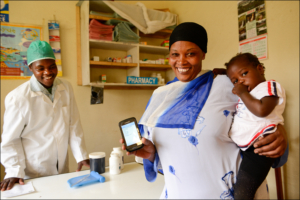Digital Health Apps in Africa Aim to Revolutionize Medical Care
 Digital Health Apps are becoming an increasingly popular part of the “mHealth” or “mobile health” industry around the world. The widespread use of digital health apps in Africa is linked to a rapid increase in cell phone access over the past 20 years. For example, only 8% of Ghanaians owned a cell phone in 2002. By 2015, that number grew tenfold to 83%. In 2017, Sub-Saharan Africa had 778 cellular and 300 mobile internet subscriptions per 1000 people.
Digital Health Apps are becoming an increasingly popular part of the “mHealth” or “mobile health” industry around the world. The widespread use of digital health apps in Africa is linked to a rapid increase in cell phone access over the past 20 years. For example, only 8% of Ghanaians owned a cell phone in 2002. By 2015, that number grew tenfold to 83%. In 2017, Sub-Saharan Africa had 778 cellular and 300 mobile internet subscriptions per 1000 people.
A Pew Research Center survey of 7,052 people across Ghana, Kenya, Nigeria, Senegal, South Africa, Tanzania and Uganda found that an average of two-thirds of respondents own cell phones. Across Africa, people use smartphones less widely than regular mobile phones. For example, 34% of respondents in South Africa own smartphones. Regardless, rising cell phone access offers the potential to improve access to health care for many across the continent.
Healthcare in Africa
Less than 50% of people across Africa can access modern health facilities, and 80% rely on public health facilities. However, public health facilities often experience chronic drug shortages, causing many patients to die from otherwise curable diseases. In 2015 alone, approximately 1.6 million people in Africa died of tuberculosis, malaria or HIV-related illnesses. Proper medication or vaccines can prevent, treat or even cure these diseases.
Many African countries spend less than 10% of their gross domestic product on healthcare. The lack of funding for health care limits the accessibility to adequate health care. There is also a lack of skilled medical personnel throughout the continent, as many trained doctors are drawn to the European and American job markets.
mHealth Benefits and Innovations
Technology is now transforming healthcare in Africa by helping improve healthcare access and quality in remote areas. These digital platforms also simplify the process for doctors and policymakers to access data. In turn, doctors and policymakers can use that data to make better-informed individual and system-wide healthcare decisions.
According to a report by the World Health Organization, digital health apps also have the ability to decrease the financial and physical burden associated with transportation to healthcare facilities, “overcome communication delays” through reliable and real-time data and “increase health workers’ adherence to clinical guidelines.” The four digital health apps below are among the many innovations helping to make healthcare more attainable throughout Africa.
- Hello Doctor: The South African app Hello Doctor enables people to talk to qualified doctors via their mobile phones. Doctors are available 24 hours a day and respond to call requests within one hour. The app aims to serve an easy point of access for patients and provide health education based on doctors’ advice.
- FD-Detector: This app detects fake medications by coding and determining their authenticity. Nigeria has long faced drug counterfeit issues. In June 2018, Nigeria’s National Agency for Food and Drug Administration destroyed an estimated $10 million worth of counterfeit drugs. Part of the problem is that less than 2% of medications prescribed in Africa are actually produced in the continent, which both limits access to local drugs and forces patients to pay the increased prices of imported drugs. FD-Detector uses a medication’s bar code to authenticate it and verify its expiration date. The app was created by five teenage girls from Nigeria, whose innovation won the 2018 Tehnovation Challenge—an international competition in which girls from around the world learn how to become technology leaders and entrepreneurs.
- mTrac: mTrac is a mobile health app that allows health workers in Uganda to submit weekly health surveillance data via SMS. As data is collected, an “SMS alert is sent to every member of the district health management team for immediate response when any preset threshold is reached”. For example, according to the United Nations Children’s Fund. “20 cases of typhoid or a single case of viral hemorrhagic fever” would trigger an alert to local health officials. By the end of 2020, mTrac hopes to expand its current database of 62,000 registered health workers to 300,000 registered users.
- Market Garden: The Institute for Social Transformation, a Ugandan nonprofit, developed this app designed to connect its primarily female vendors with local Ugandan grocers and consumers looking for fresh products. This direct link reduces crowds, allowing vendors to sell produce in adherence to COVID-19 social distancing restrictions. As a result, vendors can continue to safely earn an income during the lockdown. The Market Garden app allows vendors to receive direct mobile payments. This feature reduces the risk of virus transmission through cash exchanges.
Challenges for mHealth
The cost of cell phones and unreliable cell phone service serve as barriers to digital health in Africa. For these reasons, mHealth is biased toward wealthier groups. In Uganda, for instance, 93% of individuals with secondary education or higher own a mobile phone. Compare this number to the 61% of individuals with lower levels of education and the accessibility gap becomes clear. Gender also plays a role: six of the seven countries surveyed by the Pew Research Center, men are more likely to own a mobile phone than women.
For mHealth to continue expanding and thriving throughout the continent, the Brookings Institution states, “Governments will need to play an active role…through regulation, legal frameworks, and technical training in the health sector.” When access to technology becomes widely available, digital health apps in Africa have the power to make healthcare widely accessible.
– Zoe Engels
Photo: Wikimedia
